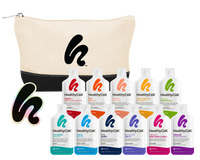What Is Beta Glucan?
One of the dietary fibers attracting increasing interest among researchers and nutrition aficionados is the soluble dietary fiber beta glucan, found in oats, brown rice, barley, baker’s yeast and medicinal mushrooms like maitake and shiitake. Beta glucan acts as a soluble fiber prebiotic (food for your probiotics) in your gastrointestinal tract, assisting your gut’s probiotics (beneficial bacteria) in functioning optimally, and it has so many other benefits.
Beta Glucan Benefits
For years beta glucan has been used in alternative medicine for everything from weight loss to cold and flu prevention to fibromyalgia. But recently clinical researchers have been putting beta glucan to the test in the lab and a host of beta glucan benefits have now been documented in clinical studies. A few proven beta glucan benefits are:
1. Beta glucan can lower LDL (“bad”) cholesterol and reduce heart disease risk: The evidence was so strong that in 1997 the FDA approved a health claim that beta glucan derived from oats helped to lower cholesterol levels and risk of heart disease.[1][2]
2. Beta glucan can boost immune function: Beta-glucan stimulates the production of white blood cells, which can kill tumor cells and repair oxidative damage and expedite the recovery of damaged tissue.[3][4]
3. Beta glucan can improve gut health: When study participants ate foods high in beta glucan, researchers observed that they produced more short-chain fatty acids in their digestive system — a great marker of intestinal health.[5]
Beta Glucan Benefits on the Horizon
Armed with reams of anecdotal reports and case histories, researchers are investigating beta glucan’s effectiveness as a preventative or treatment for a wide range of conditions. Although more clinical trials are needed, preliminary research has yielded positive results for using beta glucan to help manage or treat the following conditions:
• Cancer: Researchers found that oat beta-glucan molecules were cytotoxic against multiple cancer cell lines without harming normal cells.[6]
• Diabetes: Analyzing previous research on beta-glucan and diabetes, researchers found that dietary intake of beta glucan may help protect against diabetes-related complications by controlling blood sugar levels, lowering cholesterol, and keeping blood pressure in check.[7][8]
• High Blood Pressure: Oats containing beta glucans have lowered the blood pressure of overweight patients and patients with hypertension.[9]
• Weight Loss: Beta glucan from oats appears to effectively reduce body weight for animals.[10] There is also some evidence that eating plenty of beta glucan-rich foods could help to reduce the incidence of metabolic syndrome, one symptom of which is being overweight or obese.[11]
Beta Glucan Making Its Way into Vitamins
Advanced nutritional supplements in MICROGEL™ form are using beta glucan as a gel to hold extremely small micronutrient particles. One example is Bioactive Multi by Healthycell — a broad-spectrum multivitamin that delivers ultra-small essential vitamin and mineral particles through a prebiotic gel for maximum absorption. The gel in the multivitamin is made of prebiotics, including acacia gum, citrus pectin, and oat beta glucan.
Key Takeaway: The Power of Beta Glucan
Consuming the prebiotic beta glucan may decrease the risk of cardiovascular disease, certain types of cancer, improve the immune system, reduce inflammation, and spur weight loss. So, add some organic oatmeal to your morning routine!
To your health,
Dr. Vincent Giampapa, MD, FACS
Visiting Scholar, The Sinclair Lab
Harvard University, Boston, MA
Cell Aging Researcher & Author
Director, Cell Health Institute




